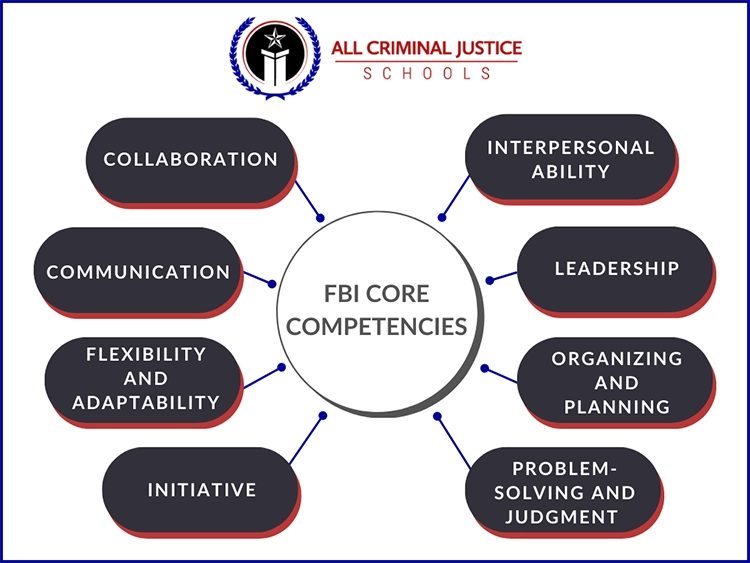In this article
How Can I Become an FBI Special Agent?

FBI agent requirements at-a-glance
What you’ll do: A variety of roles and positions are available to support investigations and law-enforcement duties
Where you’ll work: In Washington, D.C. or at a field office in the United States or abroad
Education you’ll need: Bachelor’s degree or higher
Median annual salary: $91,100, according to the U.S. Bureau of Labor Statistics
What does the FBI do?
The Federal Bureau of Investigation (FBI) is one of several national security organizations that perform a wide variety of law enforcement and intelligence-collecting responsibilities. It investigates crimes, including terrorism and other threats to national security, as well as shares services with law enforcement agencies.
Because of its broad scope of responsibilities, the FBI needs people with a wide array of skills. Some of the in-demand roles include intelligence analyst, security experts and financial professionals. The FBI is continually recruiting for qualified agents and specialists in these and other areas.
Like other federal agencies such as Homeland Security and the CIA, the FBI requires new hires to be U.S. citizens, pass a background check as well as pass and adhere to the department’s drug policy, among other requirements. You must be between 23 and 36 at the time of hire, and males must be registered for the Selective Service. Active military and veterans who apply may receive a veteran’s preference for their application.
The FBI has additional requirements that some other federal agencies may have, including:
- No felony convictions
- Student loans must be in good standing
- Child support must be in good standing
- All federal, state and local taxes must be filed
- No involvement with organizations intending to overthrow the U.S. government
- Have a valid driver’s license and at least six months driving experience
How to join the FBI: 8 steps to a career as an FBI agent
Choose what you want to study.

FBI agent education requirements:
Special agent applicants must have a minimum of a bachelor’s degree and two years of work experience. Some specialized positions will require a graduate degree. In those cases, one year of work experience is needed, too.
The FBI has a broad range of positions available—generally, the FBI is looking for expertise in disciplines that require logic, analysis, and critical thinking. Degrees in these fields are particularly useful:
• Science, Technology, Engineering and Math (STEM)
• Criminal Justice
• Linguistics
• Law
• Military & Law Enforcement
• Education
• Cybersecurity & Technology
• Medical & Health Care Services
• Psychology & Counseling
• Accounting & Finance
Candidates with foreign language experience are also highly desirable. The FBI cites the following among the most critical languages for its operations:
• Arabic
• Chinese
• Farsi
• Korean
• Punjabi
Find the right school.

Once you’ve determined what you want to study, it’s time to find a school that offers your intended major. Learn about the school’s reputation and the kinds of classes you will take to determine if a school’s program aligns with your goals.
It’s important when exploring programs to make sure that the college or university is accredited. The FBI, and some other federal agencies, specifies that your degree should be from an accredited school.
Academics shouldn’t be the sole factor when selecting a school. Take into account a school’s location, size, campus culture, and whether the program fits with your schedule — all these elements will help you decide which program suits your particular needs.
Apply to your school.

You will need a high school diploma to enter a bachelor’s degree program. Some schools may allow entrance with a GED. Other requirements, including high school GPA and SAT scores, will depend on the school. More competitive schools will expect a GPA above a 3.5, while other colleges that aren’t as competitive will admit students with lower GPAs. In some instances, a high SAT or ACT score can help boost your chances of admittance.
Earn your degree and consider an internship with the FBI.

Earning a bachelor’s degree generally takes four years of full-time study. There are some accelerated programs available online, but prepare to give up semester and holiday breaks in order to earn a degree faster. There are also many programs that will allow you to attend classes part time if you need a slower pace to accommodate work or other commitments; these will take longer than four years to complete.
Depending on the school and program, you may need to complete an internship in your subject area to graduate. For example, education majors are generally required to teach in a classroom, and health-care majors typically complete an internship in a clinical setting. Internships usually count as credit toward your degree.
The FBI offers a 10-week internship program for undergraduates between their junior and senior years. Internships for graduate students are also offered. Interns work alongside FBI professionals in a variety of capacities, including analyzing crime data and supporting operations. These internships are paid, and are considered a direct pipeline into an FBI job after graduation. You must be a U.S. citizen to qualify and the selection process includes a background check.
Find your first job and gain experience.

The FBI requires applicants to have a minimum of two years of professional work experience. It defines this as any position that requires a bachelor’s degree, and includes supervisory, managerial and leadership responsibilities. Applicants who have a graduate degree are required to have at least one year of professional work experience.
This work requirement is a great time to gain new, real-life skills in your field. The FBI is highly competitive and seeks top-tier candidates—achieving success in the work you do, in addition to strong academics, will make you stand out as a superior candidate.
It can also be beneficial to earn additional certifications on the job before applying to the FBI. Supplementing your specialization by becoming a Certified Forensic Accountant or earning a certification in Information Security, for example, can demonstrate your expertise.
Apply to the FBI.

The process to become a special agent involves multiple steps and usually takes at least a year. To begin the process, you will need to apply online. If you make it through initial screening steps, you will undergo more a more rigorous evaluation process, including:
• Medical examination: You will need to pass a physical and vision test to ensure you meet health standards.
• Physical fitness test: Candidates must pass a fitness test that includes push-ups, sit-ups, a sprint and a 1.5-mile run. You must also pass the fitness test again after being accepted into the training program.
• Background investigation: The FBI will interview neighbors, friends, family and colleagues, both past and present, to learn about your personal background. You will also take a drug test, be fingerprinted, and have your criminal and credit record checked.
The Collegiate Hiring Initiative is the FBI’s program to recruit recent graduates (within the previous two years.) To qualify, students must have earned at least a 2.95 GPA at an accredited school and meet all other FBI hiring requirements.
Complete your field training.

Special agents and intelligence analyst candidates train at the FBI Academy in Quantico, VA near Washington, D.C. Basic field training is 20 weeks, and candidates will need to pass at least one additional physical training course during that time.
Training is comprehensive and includes investigative and academic subjects, physical fitness training, using firearms, and driving skills. New agents learn:
• Defensive tactics
• Counter terrorism and investigative techniques
• Behavioral science
• Forensic science
New agent trainees are expected to maintain the FBI’s conservative look and wear business apparel. Men wear suits and ties, and women wear dresses or suits.
After successfully completing training, you’ll receive an assignment to one of 56 FBI field offices across the country. New agents are relocated for their first assignment and typically not assigned where their application was processed.
Advance your career.

Over the course of an agent’s career, the FBI provides additional training opportunities to keep agents updated on the latest developments in their fields.
“Training for all agencies is a constant process,” said Ghani Iqbal, a special agent with Homeland Security Investigations. Training can include everything from routine firearms training and defensive tactics to legal updates.
Employees can also be paid to take advanced coursework—for example, a two-week class on current terrorism trends at Quantico, Iqbal said. This type of training is particularly common for people who are moving to a new area or specializing in a particular subject matter.
Decide if a career as an FBI agent is right for you
Most people first think of special agents when they think of the FBI. It’s true that special agents are an integral part of FBI operations, but there are numerous other positions that are as vital to the success of the organization. These employees represent a wide array of experience and skill sets:
- Special agent:
- Agents conduct interviews and investigations, execute search warrants and arrest suspects. They must be prepared for assignments that can be dangerous.
- Biologist:
- Those with a background in biology and genetics help in forensic investigations, such as DNA analysis.
- Computer Scientist:
- There are many opportunities for computer and technology experts within the FBI to develop and maintain network and security systems, as well as utilize those skills to aid investigations of cyber and other crimes.
- Electronic surveillance specialist:
- Experts track and conduct electronic surveillance, and monitor and report on those tracking activities.
- Intelligence analyst:
- Analysts focus on breaking down leads and sharing information, and contribute to implementing operations. They can work in several different areas, such as counter terrorism, counter investigations or the cyber division.
- Linguist:
- Experts use their proficiency in written and verbal language, along with cultural knowledge, to translate and provide context to interviews and information gathered in the course of an investigation. The FBI has about nine languages it deems as high demand.
- Forensic accountant:
- As experts in tracking down financial records and transactions, forensic accountants investigate crimes involving financial criminal wrong-doing.

Critical skills the FBI is looking for
The FBI identifies eight Core Competencies that represent the knowledge, skills and characteristics it desires most in its agents. Potential candidates will be evaluated on each of these competencies during the screening process to see if they will be a good fit for the Bureau.
- Collaboration: Ability to work together to solve problems, develop ideas and work toward a common goal
- Communication: Express thoughts clearly and persuasively, both orally and in writing
- Flexibility and adaptability: Respond to unanticipated situations; manage and promote positive changes in your work
- Initiative: Willingness to take on new projects and prepare for additional workload
- Interpersonal ability: Deal effectively and establish rapport with others; show sensitivity and mediate concerns
- Leadership: Gain respect and loyalty of others; motivate and inspire; give guidance and direction
- Organizing and planning: Set priorities, timetables and goals; develop plans
- Problem-solving and judgment: Critically evaluate problems and causes, manage risks and accept responsibility
How long does it take to become an FBI agent?
It’s a long process to become an FBI agent—generally at least six or seven years.
First you need at least a bachelor’s degree, which typically takes four years of full-time study. You will also need at least two years of full-time professional work experience. If you have a graduate degree, you will only need one year of work experience.
Then, expect the application process to take at least a year. Training time at the FBI academy is about five months long.
Where FBI agents work
The FBI has about 37,000 employees, and most of them work at field offices throughout the United States or headquarters in Washington, D.C. A small number, about 250, staff offices located around the globe.
There are 56 FBI field offices in the United States. Some offices cover the entire state, like the Seattle office. Others cover specific regions. For example, the Albany office covers several counties of New York, and all of Vermont.
The FBI will move agents and other employees to meet its need at any given time; overseas duty may be required. Employees should expect that when accepting a position with the FBI.
FBI agent salary and job outlook
The median salary for an FBI agent is $91,100 per year, according to the Bureau of Labor Statistics (BLS). The BLS includes all law enforcement together in its median salary and job outlook information.
Your actual salary will be determined by a federal pay scale that includes several variables. These include your experience and the indexed cost of living for your assigned location. Because of these variables, there’s no specific salary for an entry-level agent. To get an idea of pay scales and salaries, use the federal salary website.
FBI jobs also include a comprehensive benefits package. This includes relocation assistance, pension plan and 401k, and ability to retire after 20 years of service.
Professional resources
Special agents and other FBI personnel will have opportunities for professional development. Like any other profession, it’s important to stay abreast of new developments within your career field. Here are three examples of professional associations that can be useful to many security, STEM and financial areas:

